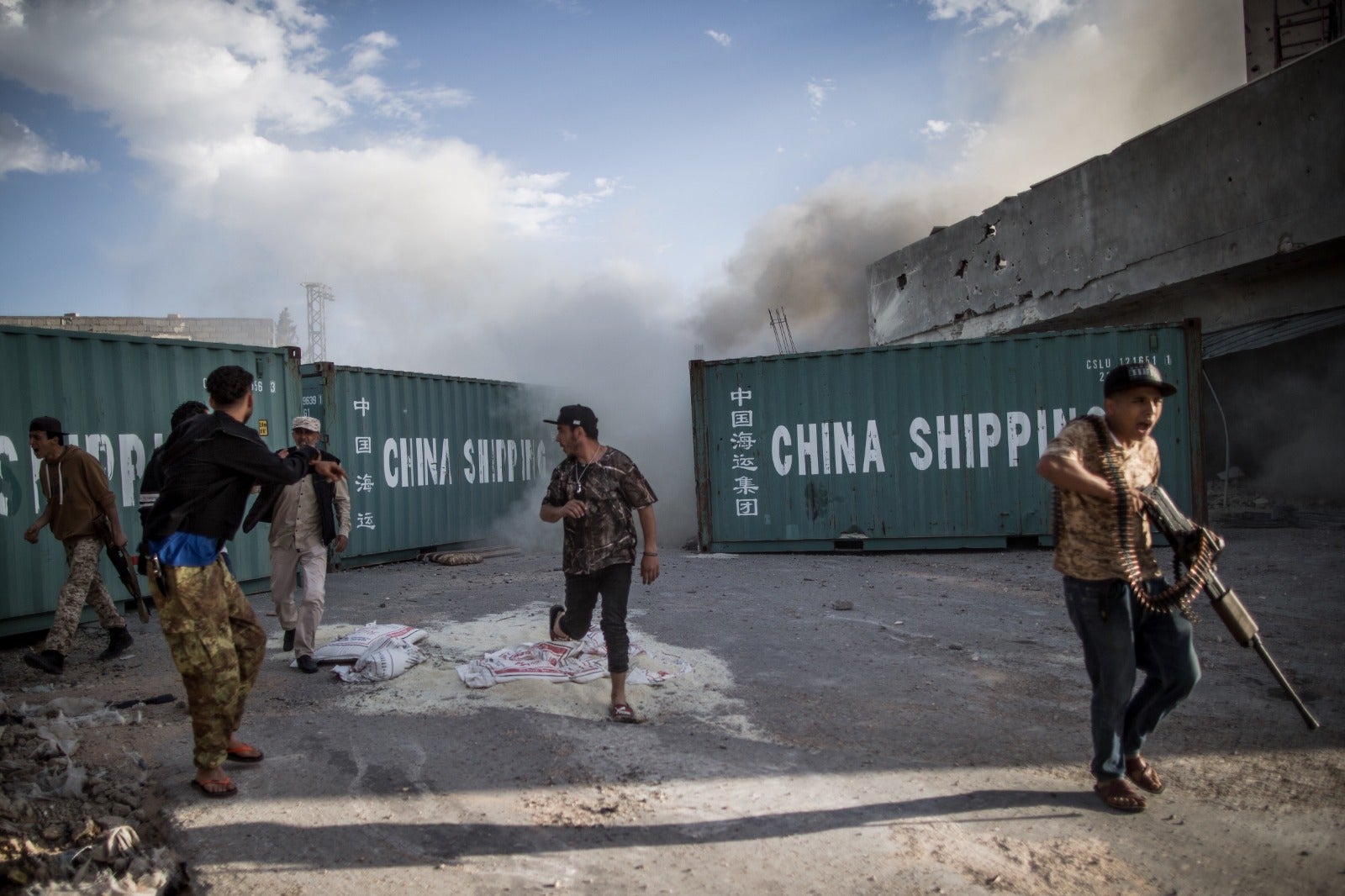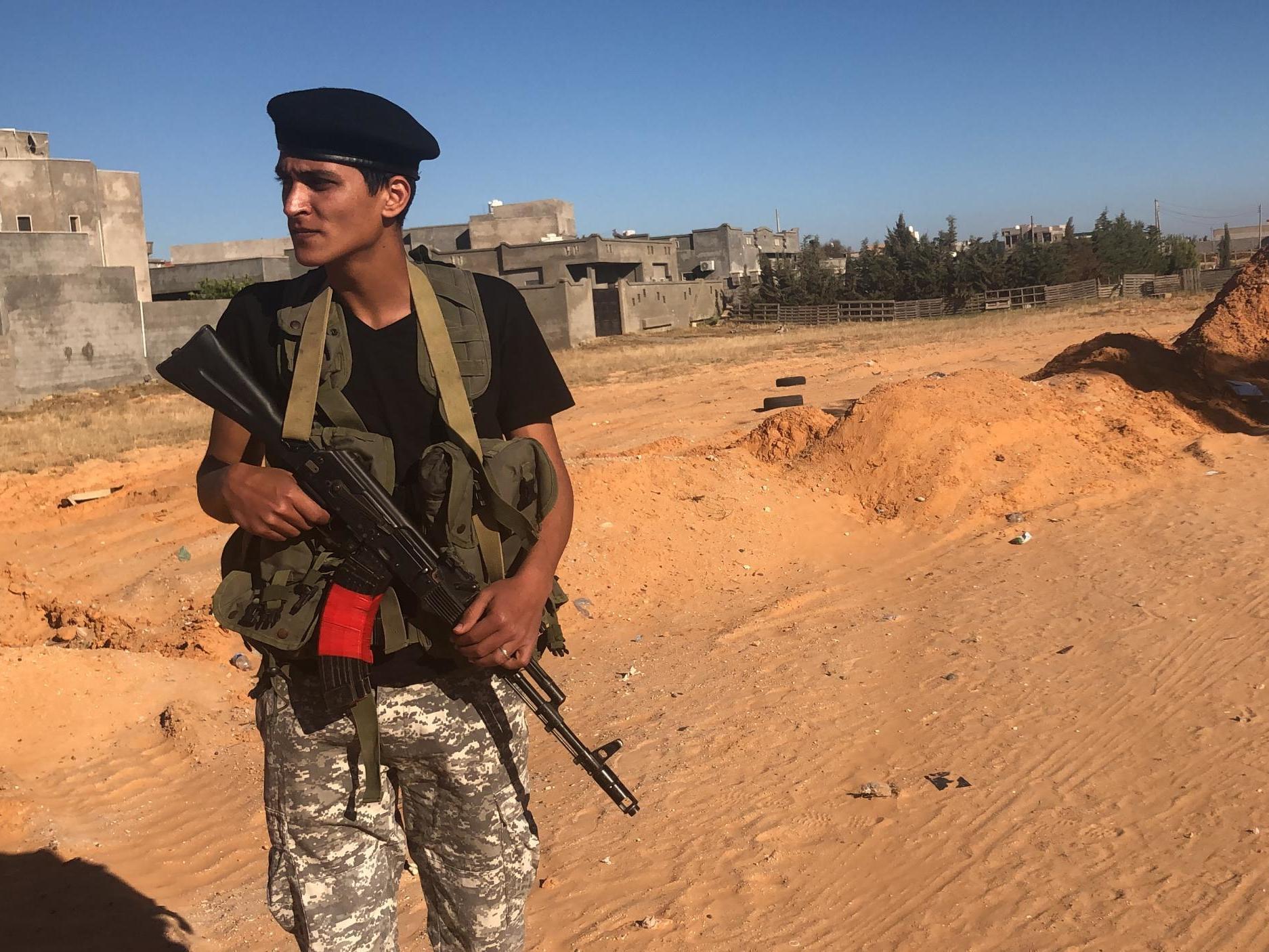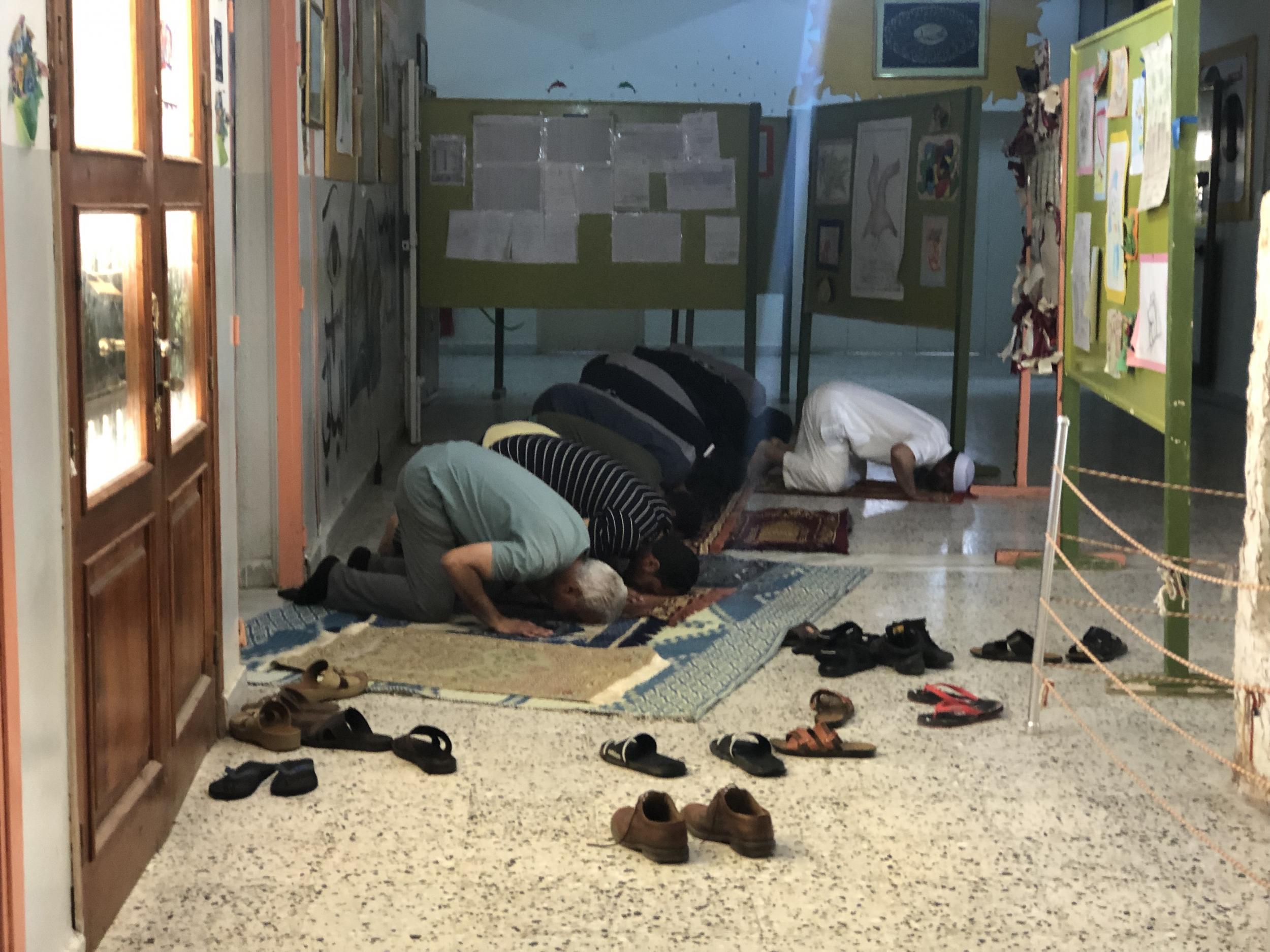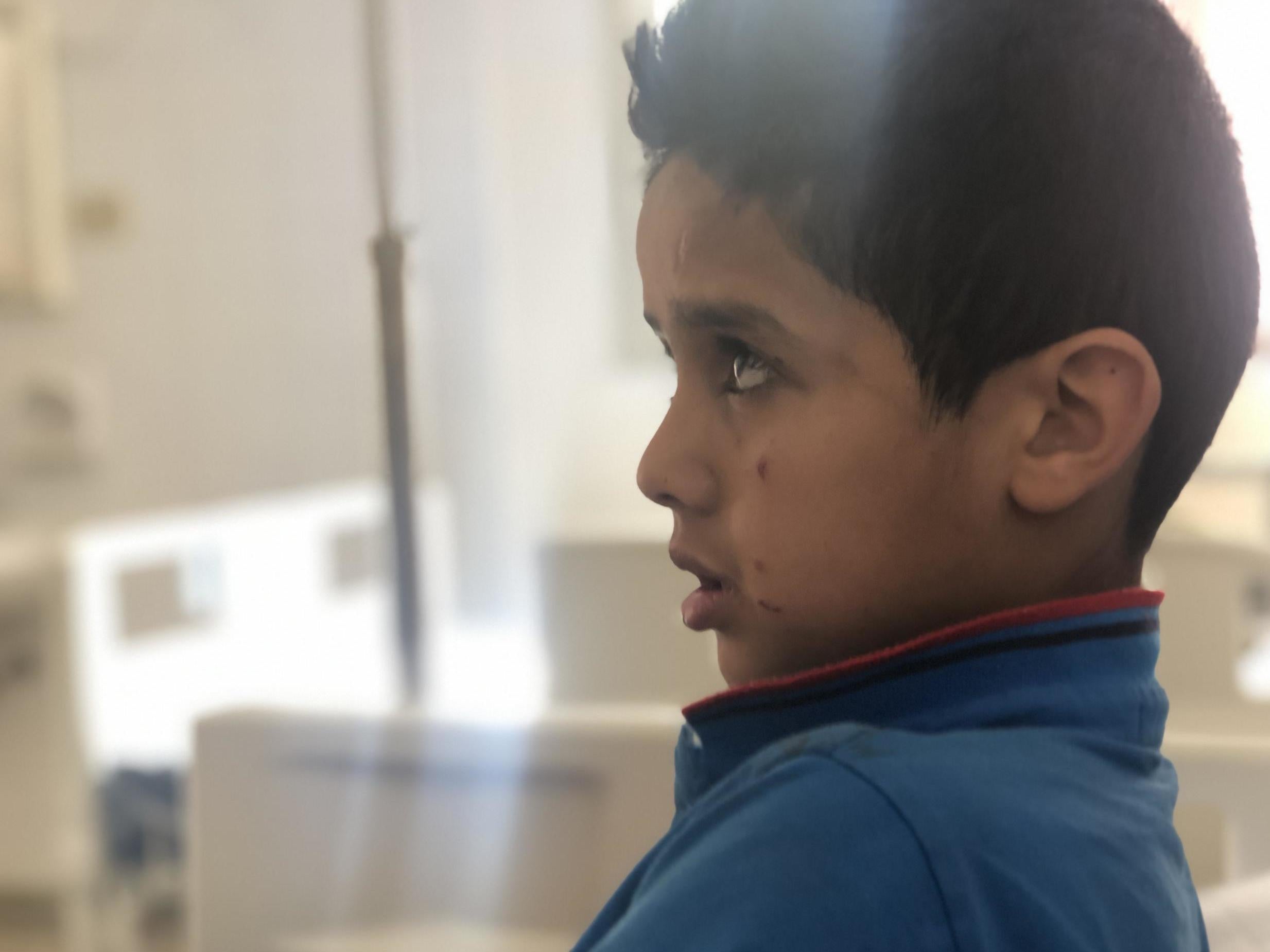On the front lines in Libya’s latest war, a proxy battle is leaving the civilians to suffer
The Battle for Tripoli: In Libya’s capital, Borzou Daragahi finds a city caught between warring factions, and their international backers
Your support helps us to tell the story
From reproductive rights to climate change to Big Tech, The Independent is on the ground when the story is developing. Whether it's investigating the financials of Elon Musk's pro-Trump PAC or producing our latest documentary, 'The A Word', which shines a light on the American women fighting for reproductive rights, we know how important it is to parse out the facts from the messaging.
At such a critical moment in US history, we need reporters on the ground. Your donation allows us to keep sending journalists to speak to both sides of the story.
The Independent is trusted by Americans across the entire political spectrum. And unlike many other quality news outlets, we choose not to lock Americans out of our reporting and analysis with paywalls. We believe quality journalism should be available to everyone, paid for by those who can afford it.
Your support makes all the difference.The ominous hum of the planes in the night sky above interrupts the young men’s light-hearted banter. A field commander named Ayman al-Omry calls out to them. “Phones!” he orders.
The fighters, positioned south of the Yarmouk military base on the front lines outside of the Libyan capital, Tripoli, quit staring at their Facebook feeds and stuff their smartphones into their mismatched camouflage trousers. A dim, dreary sliver of moonlight illuminates an overcast night.
The planes draw nearer, their monotonous hum piercing the quiet. Laughing and joking a few minutes ago, the young men defending the capital from the forces of warlord Khalifa Haftar now tense up and crowd against the wall of a disused garage that doubles as a forward operating position.
Sporadic automatic weapon fire opens up, with both sides firing high-calibre guns towards each other. Mortars land nearby, sometimes striking terrifyingly close to the garage. Nearly 80 per cent of the casualties suffered by the men are caused by airstrikes, one commander tells me.
The planes tend to come out during nights of heavier cloud cover, avoiding clear, starry nights for fear of drawing anti-aircraft fire. At the garage, the young men spot dots of light descending towards the ground, followed by the glow of explosions and earth-shaking thuds. The planes get closer. The thuds get louder.
“The drones are coming day after day,” says Omry, a 45-year-old father of four.
“Then the planes come, with seven missiles each. We count them, one by one. Where will the next one hit? Will the next one hit us?”

Haftar, a former army colonel and onetime western intelligence asset, on 4 April declared war on Tripoli’s UN-backed Government of National Accord, an authority supported by many of western Libya’s armed groups as well as its main political parties, including the Libyan branch of the Muslim Brotherhood.
He created his Libyan National Army some five years ago, hoping to unite under his rule a nation fractured following the 2011 collapse of Muammar Gaddafi’s four-decade dictatorship.
He conquered much of the east, including the country’s second city of Benghazi, and the sparsely populated south of the country.
Haftar’s forces are now located just a few hundred metres from the disused garage, past the earthen berm blocking the roadway and along the pockmarked asphalt. They have better weapons and perhaps less to lose than those defending the city.
By day, the conflict has quickly turned into a chaotic series of skirmishes and artillery and mortar strikes along a jagged front line that skirts southern and southeastern Tripoli.
“We see a car coming at us and we shoot at it,” says Muftah al-Shalady, a 25-year-old oil engineering student from the city of Zawiya.
He has suspended his education to come to the front lines. “Maybe we kill two people. Maybe more. We are outgunned. We don’t have any strategy. We’re not soldiers.”
By night, surveillance drones scour the terrain along the front lines separating the armed forces of eastern Libya. Then combat planes, possibly retrofitted agricultural aircraft supplied by Haftar’s patrons in the United Arab Emirates, unleash airstrikes.
“Our air forces are still continuing to strike the holdouts of the terrorist criminals, in support of our ground forces,” Colonel Ahmed al-Mismari, Haftar’s spokesperson, told reporters on 16 May. “The battle now is very close to the main neighbourhoods of Tripoli.”
The battle lines fall well within Tripoli’s metropolitan area, a city of 3 million people that is among the most densely populated areas in north Africa.
Young men fight ferociously, while just a few miles up the road, mothers and fathers with children in tow shop for food, furniture and clothes at well-lit stores.
“Every day we have 15 to 20 war injuries, mostly at night,” says Najib Birgly, an orthopaedic surgeon at a hospital in Tajoura, east of the capital and near one of the front lines.
“Right now we’re stable. But we lack some things, and every day the supplies get less and less as the injuries get worse and worse.”
Then the planes come, with seven missiles each. We count them, one by one. Where will the next one hit? Will the next one hit us?
Universities and grammar schools have been shuttered. Prices are up. Summer is coming, promising more blackouts and water outages. On 20 May, gunmen allegedly allied with Haftar stormed a key water pump, ordering its engineers to cut off the supply of water to the capital.
“There’s no stability, there’s no life,” says Abdul Wahab al-Tarhouni, a 33-year-old employee of an electrical supplies shop in Tripoli, sipping tea with his friends in Algeria Square.
“We are drifting from day to day. And people have seceded from life, they don’t care about Haftar or anyone else.”
Ghassan Salame is a Lebanese scholar who became UN envoy to Libya in 2017. He has struggled for months to bring the country’s factions together to avoid the type of conflict now unfolding.
“Libya is on the verge of descending into a civil war which could lead to the permanent division of the country,” he told the United Nations Security Council on 21 May. “The damage already done will take years to mend, and that’s only if the war is ended now.”

Haftar, anointed a “field marshal” by the remnants of one of the broken nation’s two expired parliaments, has been pining for the capital for years. But this attack seemingly came out of nowhere, in that there was no immediate provocation that preceded it or apparent urgent military reason to launch it.
In fact, a long-planned UN-organised peace conference was to be held in Ghadames just a week and a half after the offensive began.
Haftar’s allies describe the campaign as part of a five-year effort to rid Libya of “terrorist groups”.
So far about 500 people have been killed, at least a couple dozen of them civilians, according to the UN. And hundreds of people have been injured, putting strain on medical services of a country already broken by more than eight years of near constant armed conflict
Some 75,000 people have been displaced, including African and other migrants desperate to make their way through Libya to Europe. They are holed up at schools or detention centres, the conflict making the west even more alluring.
The war has also reopened an opportunity for Isis, which was all but vanquished in a gruelling western-backed conflict that drove them out of the central Libyan city of Sirte. Reinvigorated, the group has launched fresh attacks in recent weeks, targeting Haftar’s forces in the south of Libya and menacing the country again.
Now there’s a security vacuum in the south. It’s very fertile ground for Isis
“We spend so much time focusing on the battle between Haftar and the government, we are forgetting the other player on the battlefield,” one international official tells me. “Now there’s a security vacuum in the south. It’s very fertile ground for Isis.”
Several well-placed international officials tell The Independent that Haftar had promised his backers in the United Arab Emirates, Egypt, Saudi Arabia, and Russia a quick victory – that he would be welcomed by cheering Tripolitanians fed up with the armed “militias” that make up the city’s security forces.
Even US president Donald Trump, whose government has been steadfastly supporting the UN-backed authority of prime minister Fayez al-Sarraj since it was launched in 2015, cheered him in a bizarre tweet that followed conversations with Haftar’s patrons.
The field marshal describes the operation as an attempt to take control of the capital and rid it of what he describes as “terrorists”. That reflects the position of the UAE and Egypt, who view any entity that includes the Muslim Brotherhood as a terrorist organisation.
Haftar went so far as to label Sarraj, the genteel 59-year-old head of the UN-backed Government of National Accord, a “terrorist”.
He scored some early, easy victories, convincing elders in towns south of the capital to hand over control without a fight, and joining forces with fighters from Tarhouna, a bastion of loyalists to former dictator Gaddafi.
But what was supposed to be a quick victory has turned into a long, deadly slog with no easy end in sight.
Before launching his offensive, Haftar gave any armed brigades in the city 24 hours to clear out or surrender. But instead of withdrawing, the armed groups mobilised. Powerful well-armed brigades from the port city of Misurata, battle-hardened during years of fighting against the forces of Gaddafi, Isis, and rival militias, teamed up with armed groups in Tripoli and the mountain town of Zintan to reinforce the city’s defences.
“We made the most of those 24 hours,” boasts Colonel Faraj Swehli, the leader of a Misurata military unit.
Haftar won control of the city’s disused international airport – destroyed in a 2014 war between rival militias – before losing it to the forces loyal to the Government of National Accord, who vacated it under heavy fire. The area remains contested.
As of mid-May, Haftar also lost some of the key battlefield advantages he had at the very start of the conflict. First came confirmation that the Tripoli government was procuring battle drones and deploying them across the front lines to counter Haftar’s forces.
Then came the stunning photos and video showing at least 21 Turkish mine-resistant armoured personnel carriers arriving in western Libya, a sign that Ankara, under president Recep Tayyip Erdogan, was not about to let its allies in Tripoli lose to a force backed by its rivals in Cairo, Riyadh and Abu Dhabi. But it remains unlikely that they’ll tip the balance in the GNA’s favour.
“The newly arrived equipment appears to have produced some immediate success on the ground, because LNA airstrikes have visibly diminished over the last few days,” says Claudia Gazzini, the Libya researcher at the International Crisis Group.
“But these gains could be short-lived because overall the forces and their equipment appear equal and in the current trajectory both sides of the conflict are likely to turn to their respective allies for more military backing.”
****
The young man behind the wheel of the little sedan can’t be more than 15 or 16, and the girls sitting in the back seat even younger. Omry orders the vehicle to stop. “This is military zone!” he tells the young man. “You can’t be here.”
They explain sheepishly they were just coming back from their home, which lies in the conflict area, where they were trying to get some blankets and supplies and head back towards the city centre, where the displaced are heading.
Omry beseeches them not to return to their home, in a neighbourhood which has turned into a ghost town, with bullet-pocked buildings lining the main highway.
Entire districts of the city have been consumed by the fighting, which for now remains on Tripoli’s suburban outskirts, an area of mostly low-rise buildings and light industry, where young families bought homes because they’re cheaper and more spacious than apartments in the city centre.
Salah Jouma, a 40-year-old manual labourer, was living in one such house. He had been urged to leave when the fighting began on 4 April, but he had nowhere to go. He, his wife, and their five children stayed home and watched the reports of the fighting on television.
On 19 April a barrage of Grad rockets struck his neighbourhood, one caving in an entire section of his house. Dust and debris were everywhere.
“The children were screaming. They were hysterical,” he recalls.
It was a miracle no one was hurt. They left the house on foot, he and his wife walking in the night while carrying and dragging their kids, aged 13, 12, nine, seven and nine months. His wife held their infant. He carried his 7-year-old on his shoulders. They walked more than three miles along a dried-up irrigation canal, until they came to the Wadi Rabaa district, where they tried to find a taxi.

They wound up like many of the displaced – in an elementary school, which have been shuttered because of the war. At one school near central Tripoli, children run around the courtyard. The kids, who have grown up over the last eight years amid war and conflict, have grown somewhat used to the chaos, and appear to adjust quicker than the adults.
“They grew up in a very wrong environment,” says Maysoon al-Diab, a 45-year-old volunteer at one school. “When I was growing up the last thing I would ever think of is a Kalashnikov. They see them everywhere all day.”
If the war drags on or moves deeper into the city, it will continue to take a toll on civilians. Both Haftar and GNA forces claim they are studiously avoiding any civilian casualties. But the UN and international rights groups have repeatedly chastised both sides for disregarding the rules of war.
Mohamed Omar, nine, and his 7-year-old brother Obeida were watching television in their house in Tajoura, near the seaside, and their mother, Awatef Muftah, 38, was cleaning up on the morning of 14 May.
It was already Ramadan, when the kids stay awake to enjoy the cool night-time temperatures. Besides, schools were closed because of the war.
The missile struck about 1:30am, hitting the outside of the family’s home. It remains unclear what the target was, and the site had been cleaned of bomb debris by the time The Independent arrived.
Hossein Attiya, the friendly and outgoing mayor of Tajoura, insists the missile was fired by Haftar’s forces, but an errant GNA missile could have also been the cause.
Pieces of shrapnel got lodged in Awatef’s head and neck. A widower, she remained on a ventilator for a week at Tajoura hospital, before she died from her injuries, never regaining consciousness.
“My mum was sweeping in front of the bathroom,” recalls Mohamed, struggling to get his words out as he recovers in a hospital bed next to his brother.
“All I heard was the sound of this missile. I covered up my brother to protect him because he is smaller than me. My mum was lying on the floor, not moving. That is all I remember.”

When he’s not at the front, Omry buys and sells various items out of a small warehouse. He is often grumpy, but generally good natured and helpful, and tells The Independent about 30 times not to photograph his face – he wants to travel abroad in the future and doesn’t want to be smeared on social media as a militiamen or terrorist. “Just no pictures,” he says repeatedly.
Omry says he’s exhausted, and hasn’t had a full night’s rest in days. He catches a few hours or minutes of sleep here and there, but that is proving difficult. One brief peaceful interlude – snatched to allow the young men to temporarily retire from the front line to enjoy a Ramadan breaking of the fast – is interrupted by a mortar round that falls just outside the disused garage. The men scamper for cover, diving for the ground. Machine gunfire opens up wildly.
Four times Haftar’s men have sought to exploit the air strikes and rocket barrages to breach the front and take their way close to Tripoli’s centre past the checkpoint where Omry spends most of his days. Each time they have been rebuffed.
Despite their show of bravado, many of the young men are evidently terrified of being at the front line. Days after he was interviewed by The Independent, Muftah al-Shalady, the 25-year-old engineering student, was shot, and is still clinging to life at an intensive care unit.
Even if they were able to break through, there’s no guarantee Haftar’s forces would be successful in taking over the capital. The field marshal has his fans in the city, and some are even vocal – a testament to the freer environment in the country’s west than in its east. But there is no overwhelming outpouring of support.
Ironically, Haftar’s putsch may have accomplished exactly what he set out to fight. Over the past six months, goaded by the United Nations, many of the militias that used to dominate Tripoli and frighten residents had been slowly incorporated into the army and police. Gone were the wild-haired young guys in flip-flops driving around in pickup trucks with high-calibre guns.
Instead well-behaved young men drive around in ordinary patrol cars, easing the anxieties of Tripoli residents.
“You don’t hear the gunfire,” says Abdullah bin Abdullah, a 62-year-old Tripoli resident and oil company manager. “Most of the militias are engaged by the ministry of defence or ministry of interior. Two or three years ago, yes, there were militias.”
Now the militiamen with wild hair in trucks bearing the names of Misurata, Zawiya, and Zintan, the same guys that Haftar was supposedly trying to drive out of the capital, are back in full force, worrying Tripoli residents.
Unsurprisingly, the great bulk of Libyans favour neither the collection of armed groups that have reigned over Tripoli since 2011 or Haftar, who left the eastern city of Benghazi largely in rubble when he pushed out Islamist militias, and has imposed a repressive atmosphere similar to that of his mentor, Egypt’s Abdel Fattah el-Sisi.
Some Libyans hostile to the government in Tripoli note that their relatives in the east living under Haftar describe a worse quality of life than in the west – a general lack of services and security.
One Benghazi native, who fled the city after Haftar took over, says that his home in the city was seized by a member of field marshal’s special forces, who had the temerity to call him and ask for his forgiveness.
“They kill people,” says the Benghazi man, who asked that his name not be used. “They are jailed and tortured and their bodies dumped on the street,” he says, of dissidents and anti-Haftar Libyans.
Haftar’s supporters are confident they will be able to conquer Tripoli just as they did Benghazi, a three-year battle that Mismari, the field marshal’s spokesperson, on 16 May described “as a great historical epic in which the army and the people put their hands together in their battle against terrorists and criminal groups”.
Mismari claimed 17,000 fighters were holed up in Benghazi with heavy weapons, a number that many consider exaggerated. There too, he said, fighters were getting help from inside and outside Libya.
And it is true that momentum appears to be on Haftar’s side. Though sometimes gruelling, he has posted a string of wins, even if in the case of Benghazi or Derna, it has meant the destruction of the city. But Haftar may also have overreached. His supply lines remain vulnerable.
Overseas officials say they have been taken aback by Haftar’s charge for the capital, arguing there is evidence that other countries are being at least partly dragged into the war by Haftar himself.
Algeria, the gendarme of north Africa, has no love lost for Haftar and has grown vocally critical of the offensive, noting with alarm the bombing of a north African capital. Trump has voiced support for Haftar, but he may encounter resistance from US State Department and military officials working on a political solution. The defenders of the capital are determined not to allow Haftar to take the city. As messy as Libya has been, they fear it will be worse if another strongman like Haftar takes over.
“Over my dead body Haftar will win. No way,” says Colonel Hossein Shitat, a Misurata commander helping in the defence of Tripoli. “We are determined, and we have a cause.”
Read the first part of the The Battle for Tripoli series, Libya: UN-backed government defending capital from warlord Haftar now using drones on front lines

Join our commenting forum
Join thought-provoking conversations, follow other Independent readers and see their replies
Comments